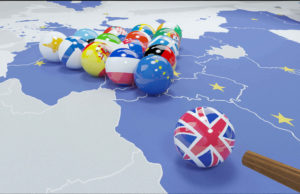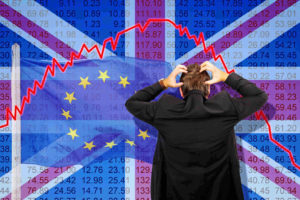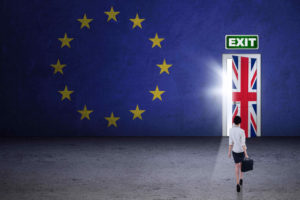Brexit Blues in the drinks industry
As we reported last June, depending on the details of the new – as of yet undefined – trade relationship and agreement between the UK and the EU, any new trade regulations and barriers are only likely to increase costs for both imports and exports.
In the meantime British food and drink exporters have called on Theresa May’s government to secure tariff-free trade with Ireland at the earliest opportunity.
In an open letter to the government signed by 35 representative bodies (employing four million people) the British food and drinks supply chain signatories pointed out that, “Complete interdependence of the UK and Ireland is essential to ensuring our food security and to feeding both countries”.
The letter explained, “A cliff-edge scenario that results in a sudden transformation to our trading arrangements with Ireland would be hugely damaging for our industry and for the wider economy on both sides of the border.
“We are pleased that the Prime Minister is seeking a ‘friction-less’ border between the UK and Ireland post-Brexit.
“It’s imperative that once Article 50 is triggered, the future border arrangements are high on the target list for prompt resolution.”
Ireland remains a bigger customer to the UK than the US, China, Russia, Brazil, Canada and Japan combined, with nearly one fifth of all food and drinks exports going to Ireland and more than a third coming in the other direction from Ireland.
Naturally, Food Drink Ireland welcomed the signatories’ call for an early agreement on the UK-Ireland trading relationship.
“With 40% of total food and drink exports going to the UK, Ireland is four to six times more exposed than any other European country to Brexit,” warned FDI Director Paul Kelly.
In order to minimise “economic uncertainty and potential damage” to the food and drink sector, discussions on the future EU-UK trading relationship must start as soon as possible, he said, adding that the agreement should take account of the special case of the Island of Ireland.
Failure to do so could lead to unnecessary legal uncertainty and a reversion to high World Trade Organisation Most Favoured Nations tariffs on EU and UK imports of food, drink and agricultural products.
Any transitional arrangements must prioritise: avoiding tariffs and import quota regimes as well as avoiding requirements for new customs procedures (eg documentation and certification) which would create barriers to trade, delays and increase administrative costs.
Importantly, customs procedures must be dealt with as part of the first phase of Article 50 negotiations.
Beverages & British export values
Last year Ireland exported €1.4 billion-worth of drinks of which 26% went to the United Kingdom (€270 million was sold to Britain and €95 million was sold to Northern Ireland).
The US is our largest market, accounting for 37% of drinks exports worth €514 million, with Britain and then Northern Ireland in second and third places.
The relatively high UK market share of 26% for drinks exports compares to 14% for overall exports to the UK, highlighting just how drinks exports are more dependent on the UK market than overall exports.
Soft drinks and cider exports are particularly reliant on the UK market but 68% of Ireland’s whiskey exports and 75% of Ireland’s liqueur exports are sold in markets outside the EU.

The relatively high UK market share of 26% for drinks exports compares to 14% for overall exports to the UK, highlighting just how drinks exports are more dependent on the UK market than overall export
British import values
The UK provided 49% of our total food and drink imports last year. In 2016 we imported €1.1 billion-worth of drinks with the UK providing 43% of this through Britain (€419 million) and Northern Ireland (€40 million).
The UK is our largest source of drinks imports, far ahead of France at €104 million. In contrast, only €18 million-worth is imported from the US compared to the UK’s €459 million. But UK imports also include products both produced in the UK and produced elsewhere but distributed from the UK.
Soft drinks imports accounted for €398 million of which Britain supplied €235 million or 59%.
On the other hand, Ireland only imported €15 million-worth of whiskey of which Britain supplied €8 million-worth or 53%. Imports of other spirits and liqueurs however amounted to €81 million of which Britain supplied €25 million and Northern Ireland €22 million making the UK share 59%.
However contrary to popular belief, our wine imports (excluding sparkling wine) accounted for €271 million of which Britain supplied just €21 million or 8% according to CSO figures.
However the UK supplied €53 million-worth of beer imports or 45% of the total €116 million.
Brexit’s implications for the UK beer industry are no less painful than our own.
“I would urge the Government to look at the value of the UK’s food and drink sector to the British economy and ensure that, as we leave the EU, our sector is protected,” commented the British Beer & Pub Association’s Chief Executive Brigid Simmonds, “Beer is the UK’s third biggest food and drink export, worth more than £550 million to the UK economy.
“As new trading relationships are developed” she said, “it’s important to ensure that we can export on a competitive footing and trade as freely as possible. Currently, 63% of Britain’s beer exports go to the EU.
“Boosting current electronic trading arrangements, which at the moment facilitate the smooth trading of beer across borders, should be an important part of any new trade agreements.”
Border costs
Few believe that border trade and regulatory costs will remain as they are at present post-Brexit.
In ABFI’s report on The Impact of Brexit on the Drinks Industry last December one member estimates that their experience of hard borders in other jurisdictions suggests that delays at border points would add “an additional hour or €100 per truck movement to costs”.
And – especially in relation to the drinks industry – economist Jim Power has pointed out that, “In the event of Brexit, the cross-border shopping implications could be huge”.
ABFI Director Ross MacMathuna believes that Jim Power’s sentiments are “not far off true”.
He believes, “Until we know more, our broadest concerns are the Geographical Indicators and the border issues”.
Ah yes, those border issues…. “Revenue is currently engaged in analysis and contingency planning, examining all potential post-Brexit scenarios,” stated the Revenue Commissioners when contacted by Drinks Industry Ireland, “The issues being explored include management of the very high volume of trade through our ports and airports if the UK is to be a ‘third country’ for customs purposes; the up-scaling of computer systems and processes to deal with increased customs declarations and the scope within existing EU legislation for the use of sophisticated risk analysis and electronic systems to replace the traditional border processes to allow free-flowing movement for all exports and imports.
“However, as you will know,” a spokesman continued, “in advance of UK notification under Article 50 and finalisation of negotiations between the EU and UK for a UK exit from the EU, the precise arrangements that will apply after Brexit are not known.”
Border issues are also a concern to trade organisations such as the UK Wine & Spirit Trade Association which has warned the government there that if Brexit talks don’t achieve friction-less borders, “delays and gridlocks” at ports will encourage the resurgence of alcohol smugglers.
It fears that post-Brexit red tape will bring customs to a standstill and transform key ports and surrounding roads into lorry Parks.
The port of Dover sees 10,000 lorries arrive every day, of which 98% are from the EU. 55% of all wine imports – the equivalent of 1bn bottles of wine – come from the EU.
When the UK leaves the customs union, it would see a doubling of the cargo volumes that could be subject to inspection at British ports and nearly 800,000 lorries are carried across the Irish Sea.
Irish importer concerns
For now, the real fears for Irish importers and distributors such as Barry & Fitzwilliam’s Kevin O’Mahony are with currency.
“There’s a huge discrepancy in pricing” he points out, “which could be from €1 to €15 on a box of Cognac”.
He also wonders if there will be a significant tariff on spirits like Scotch coming into Ireland.
“If so, it will put it into a hugely difficult position,” he believes, “A €uro or two on a bottle will take it out of the game entirely.
“Thirdly, every flight between Dublin and the UK becomes a duty-free flight so what does that do to domestic sales of spirits such as Smirnoff? Most people would fly two or three times a year…. We just don’t have any clarity around these issues at the end of the day.”
Brexit Roadshow
A dedicated team of Bord Bia food, drink and horticulture specialists has embarked on a ‘Brexit Roadshow’. Over the coming weeks, visiting more than 150 Irish exporters nationwide, the initiative will see 14 Bord Bia sector managers travel across the country to conduct face-to-face in-depth analyses of the likely impact of Brexit on individual businesses.
In addition, the Minister for Agriculture, Food and the Marine Michael Creed TD recently launched ‘Bord Bia’s Brexit Barometer’, a new interactive analytical tool to be used at each consultation to help companies identify and assess their unique Brexit requirements, risks and opportunities.
Developed by Bord Bia in conjunction with PwC Ireland, the Brexit Barometer includes 100 questions across six specific risk areas – Routes to Market, Customs and Tax, Supply Chain, Trade, Currency and Human Resources.
With the support of an onsite Bord Bia specialist, the senior management team of each participating company will be requested to come together as a group to collectively discuss each of the areas and potential scenarios.
As a company progresses through the Barometer, traffic light system feedback will be given at each stage, red representing highest risks, vulnerability and areas that need to be addressed. While Bord Bia expects the industry will be keen to engage, the organisation is initially targeting companies with the highest dependency on the UK market.
For more information about the Brexit Barometer or the seminar, visit www.bordbia.ie/brexit










